Liturgical Calendar
Semi-double Green vestments
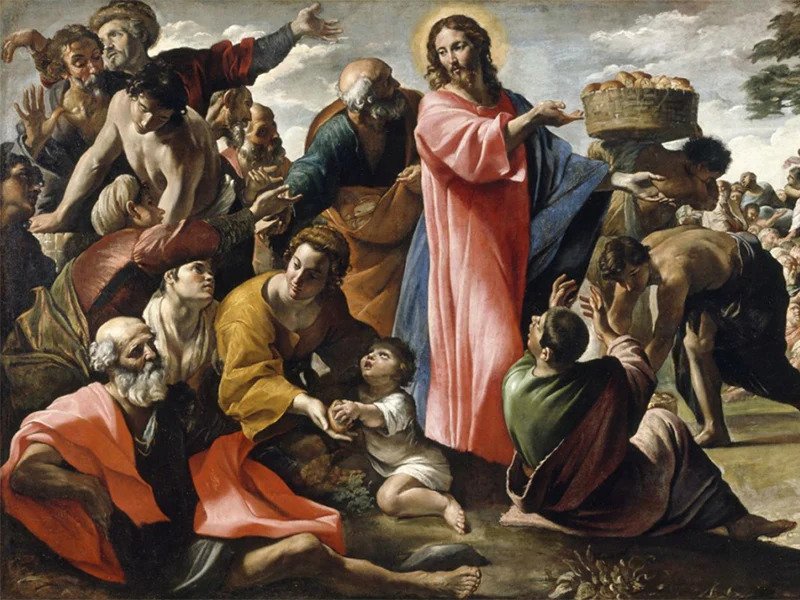
“The Lord is the strength of His people.” This wonderful Introit chant of joy and complete trust is an expression by Christians, once again, of their confidence and freedom from danger. The Gradual, Alleluia, and Offertory repeat the sentiments of the entry chant.
The Epistle and Gospel remind us of our baptized state. Dead to sin through Baptism, we have to live a new life in which sin should have no further place. Christ’s life must rule ours and carry it up towards God without any further compromise with the past and its slavery, from which He has freed us. But such sanctity would be unattainable and our progress towards God impossible to maintain if His grace did not come to our help and give us the necessary strength. Among all the supernatural assistance showered on us – and its praises are sung in the Mass of the Sixth Sunday after Pentecost – the Eucharist stands supreme. The multiplication of loaves, which pointed forward to it depicts it as the daily bread of our Christian life, the substantial nourishment which is to sustain our strength to follow Christ “without falling by the wayside”.
“Taking the loaves and giving thanks He broke and gave to His disciples to set before the people; and he blessed the fishes also and commanded them to be set before them.”
Double of the First Class with an Octave Red vestments
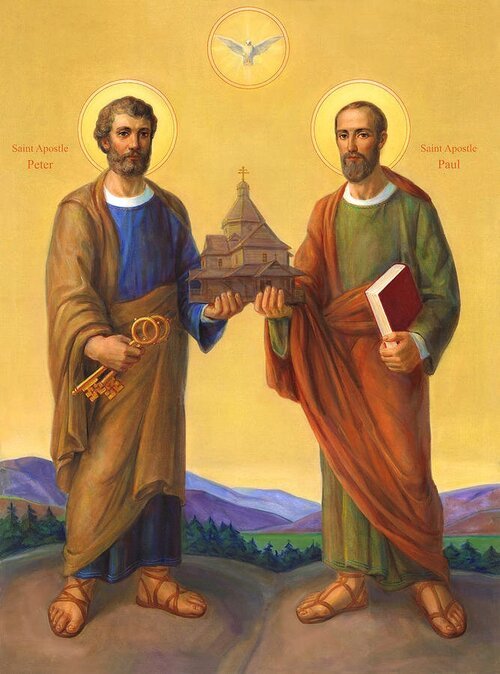
St. Peter was crucified, and St. Paul was beheaded in Rome during the persecution of Nero, in 67.
Today the whole Church rejoices, for “God has consecrated this day by the martyrdom of the Apostles Peter and Paul” (Collect). In both the grand basilicas erected at Rome over the tombs “of these two Princes who by the cross and the sword have obtained their seat in the eternal senate,” this double martyrdom was celebrated. Later, on account of the distance which separates the two churches the festival was divided, St. Peter being more specially honored on June 29 and St. Paul on June 30.
St. Peter, bishop of Rome, is the vicar, that is to say the visible representative of Christ. As is shown in the Preface, Alleluia, Gospel, Offertory, and Communion, the Jews had rejected Jesus. They also rejected His successor (Epistle), Displacing the religious center of the world, St. Peter the left Jerusalem for Rome which became the eternal city and the seat of the Popes.
St. Peter, the first Pope, speaks in the name of Christ who has communicated to him His infallibility.
St. Peter on receiving the keys is placed the head of the “kingdom of heaven” upon earth, that is to say the Church, and he reigns in the name of Christ who has invested him with His power and supreme authority (Gospel).
The names of St. Peter and St. Paul head the names of the apostles in the Canon of the Mass (first list, p. 537).
With “the Church which did not cease praying to God for St. Peter” (Epistle), let us pray for his successor “the servant of God, our Holy Father the Pope” (Canon of the Mass).
This Sunday, July 2, is the External Solemnity of the Feast of Ss. Peter and Paul.
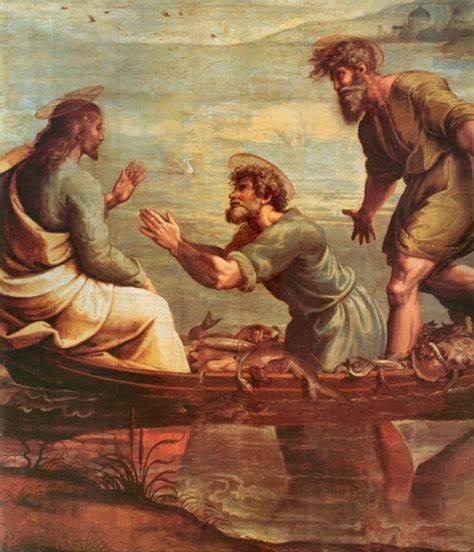
In the Epistle, the Apostle describes the tribulations which overwhelm us, and shows us Heaven, their glorious result.
But to reach heaven we must place our confidence in the Lord who alone is our refuge, our salvation and our defender (Introit, Gradual, Alleluia, Communion), and in order that our enemies may not prevail against us (Offertory) let us ask of God “that the world may walk in peace” (Collect).
The visible protection of Providence which extends to the least events is shown to us in the Gospel. The Church is represented by the bark of Peter. It is his that Jesus chose to preach from, it is Simon He commands to put off from the shore, and it is he who, at his Master’s bidding, casts his nets which are filled to breaking point. It is Peter again who, struck with astonishment and fright, adores his Master. He will be henceforth with his companions as fisher of men.
Friday after the Octave of Corpus Christi
Double of the First Class – White Vestments
Why do we adore and worship the Heart of Our Lord?
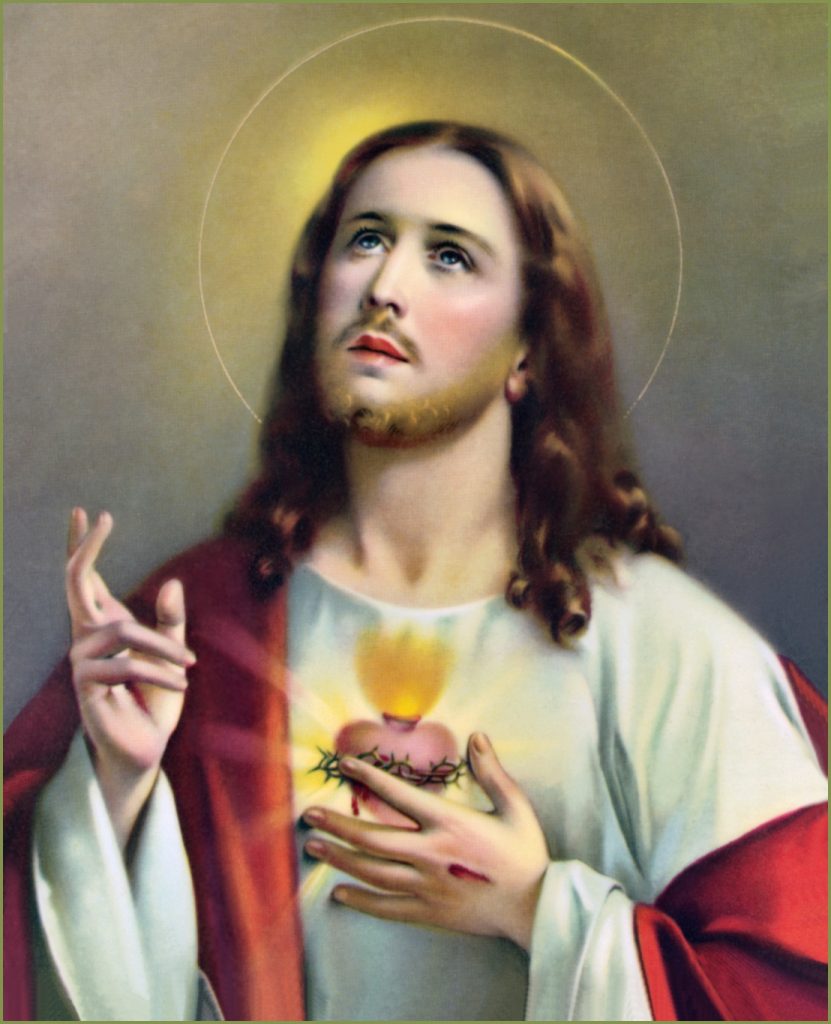
Prostestantism in the sixteenth century and Jansenism in the seventeenth had attempted to distort one of the essential truths of Christianity, namely the love of God for all men.
It became necessary that the Spirit of love, which directs the Church, should by some new means counteract the spreading heresy, in order that the Spouse of Christ, far from seeing her love for Jesus diminish should feel it always increasing.
This was made manifest in Catholic worship, which is the sure rule of our faith, by the institution of the Feast of the Sacred Heart.
Already in the Middle-Ages, many Fathers and Doctors, v. g. St. Bonaventure, and the two Benedictine virgins, St. Gertrude and St. Mechtilde, had a clear vision of the devotion to the Sacred Heart.
But in order to make this worship public and recognized, Providence first raised up St. John Eudes, who in 1670 composed an Office and a Mass of the Sacred Heart for the so-called Congregation of the Eudists. Providence then chose one of the spiritual daughters of St. Francis de Sales, St. Margaret Mary Alocoque, to whom Jesus showed His Heart at Paray-le-Monial, on June 16, 1675, Sunday after Corpus Christi, and asked her to institute a feast of the Sacred Heart on the Friday following the Octave of Corpus Christi, and asked her to institute a feast of the Sacred Heart on the Friday following the Octave of Corpus Christi. Lastly, God employed Blessed Claude de la Colombiere and the Society of Jesus for the propagation of this devotion.
In 1765, Clement XIII gave his approbation to the feast and the Office of the Sacred Heart, and in 1856 Pius IX extended it to the universal Church. In 1929 Pius XI composed a new Mass and Office for this feast and gave it a privileged Octave of the third Order.
The solemnity of the Sacred Heart recapitulates all the phases of the life of Jesus recalled in the liturgy from Advent to the Feast of Corpus Christi.
Its object is materially Jesus’ Heart of flesh, and formally the unbounded charity symbolized by this Heart, and manifested by all the mysteries of the Savior’s life, but especially by His incarnation, His death on Calvary, and the institution of the Holy Eucharist. It celebrates all the favors we have received from divine charity during the year (Collect), all His mercies (Tract), and all the marvelous things that Jesus has done for us (Introit, Alleluia).
As these manifestations of Christ’s love show the more the ingratitude of men, who only answer by coldness and indifference (Offertory), this solemnity has also a character of reparation (Collect).
It is out of love for us that Christ made Himself the victim of His sacrifice, He is thereby our Redeemer, our King of Love by right of conquest.
This Sunday is the External Solemnity of the Most Sacred Heart of Jesus.
“My flesh is meat indeed, and My Blood is drink indeed. He that eateth my flesh and drinketh my blood, abides in me, and I in him. As the living Father hath sent me, and I live by the Father, so he that eateth Me, the same also shall live by me. This is that bread that down from Heaven. Not as your fathers did eat manna and are dead. He that eateth of this Bread shall live forever.“
-John 6:56-59-
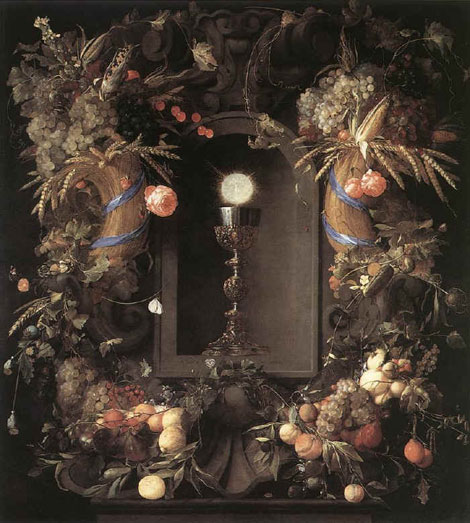
Ten times in John’s gospel, Christ insists that we eat His Flesh and drink His Blood. And He let people walk away when they took Him literally. They said, “That’s too much for us. We’re not having any of that.” And they left, and He let them leave. We have many places in the Gospels where if there is a misunderstanding, Christ corrects that misunderstanding. There was no ambiguity when Christ said that we must eat His flesh and drink His Blood. He knew what He was saying, and He meant what He said, and He allowed those who did not believe Him to walk away.
To resist the attacks of continually renewed heresies against the Holy Eucharist and to revive in the Church a fervor which had somewhat grown cold, the Holy Ghost inspired, at the beginning of the thirteenth century, the solemnity of Corpus Christi
In 1208 blessed Juliana of Mount Cornillon, near Liege, saw in a vision the full moon with an indentation indicating that a feast was missing in the liturgical cycle. The Eucharist instituted on Maundy Thursday, could not be celebrated with all the desired pomp, the Church’s thoughts being absorbed by the passion of the Savior. It was necessary and immediately after Paschaltide a feast with an octave should be established. And as the Last Supper had taken place on a Thursday, the Bishop of Liege instituted in 1246 this solemnity in his diocese on the first free Thursday after the octave of Pentecost. In 1264, Pope Urban IV extended this feast to the whole world.
The Eucharist instituted on the eve of Jesus’ death, remains the memorial of His passion (Collect). The altar is the continuation of Calvary, “the Mass announces the death of the Lord” (Epistle). Jesus is there as a victim, for the words of the double consecration tell us that it is the bread which is first changed into the Body of Christ, and then the wine into His blood: under these appearances, Jesus Himself offers to His Father, at the same time as His priests, the Blood which He shed and His Body which was nailed to the Cross.
One takes part in the sacrifice by eating of the victim: Eucharist was instituted in the form of food (Alleluia) so that we may receive in Communion the victim of Calvary. The Sacred Host has become wheat which nourishes our souls” (Introit).
The Mass is the center of the whole Eucharistic worship of the Church, and Holy Communion is the means instituted by Jesus to enable us to participate more fully in this divine sacrifice.
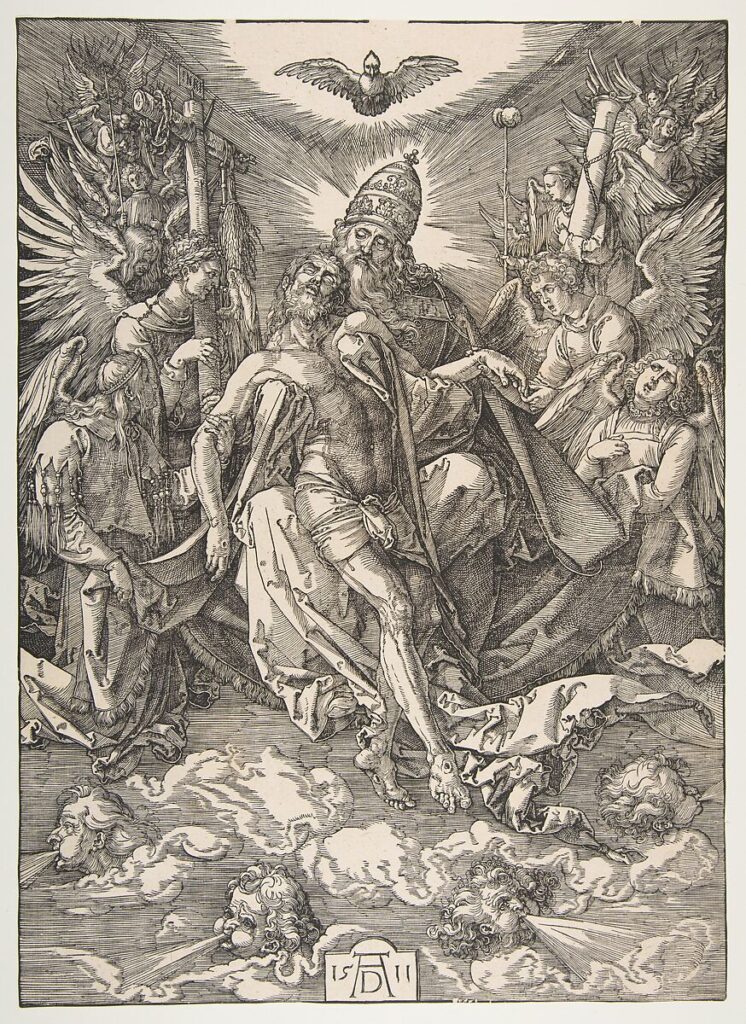
The fundamental dogma to which everything in Christianity is related is that of the Holy Trinity, of whom are all things (Epistle) and to whom are to return all those who are baptized in its name (Gospel). Therefore, after reminding us in turn of God the Father, Author of the creation, of God the Son, Author of the redemption, of God the Holy Ghost, Author of our sanctification, the Church chiefly recapitulates on the Feast of the Most Holy Trinity the great mystery which calls on us to recognize and adore in God the unity of nature in the Trinity of Persons (Collect).
The dogma of the Trinity is everywhere affirmed in the liturgy. It is in the name of the Father, of the Son, and of the Holy Ghost, that the Mass and the Divine Office begin and end, and that the Sacraments are conferred. All psalms end with the Gloria Patri, all hymns with the Doxology, and the prayers with a conclusion in honor of the three Divine Persons. Twice in the Mass we are reminded that it is to the Holy Trinity that the Holy Sacrifice is offered.
The Feast of the Holy Trinity owes its origin to the fact that the ordinations of Ember-Saturday, taking place in the evening, were continued until the Sunday morning, which had at that date no proper Mass.
Sunday is consecrated throughout the year to the Most Holy Trinity, because God the Father started the work of creation on the “first day”, the Son made man rose from the dead on a Sunday morning, and the Holy Ghost descended on the apostles on Pentecost Sunday. There existed a votive Mass, composed in the seventh century in honor of this mystery. When the ordinations were anticipated on the Saturday morning, this votive Mass was celebrated, in some places, on the Sunday, whereas in other places a special Mass was composed for the “first Sunday” or the “second week” after Pentecost. The votive Mass gradually became considered as a special feast of the Holy Trinity; it was extended in 1334 by Pope John XXI and made a feast of the first class by Pius X.
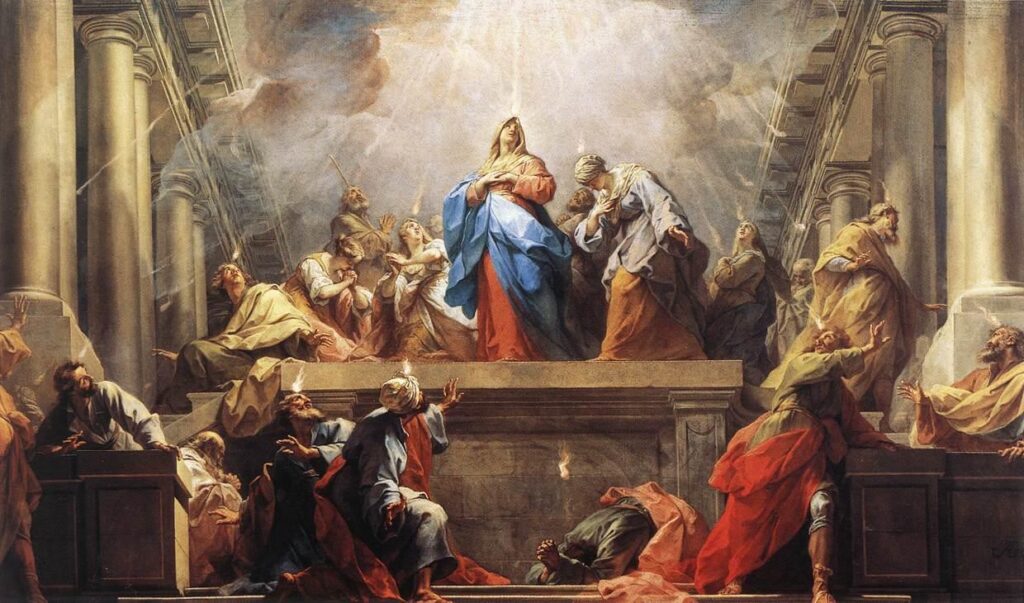
The Feast of Pentecost is the commemoration of the first manifestation of the Holy Spirit in the disciples of Jesus Christ, and consequently that of the foundation of the Church. It was for this reason that the basilica dedicated to St. Peter, the Head of the Church, was chosen for the Station held today.
Jesus, as the Gospel tells us, has foretold to His disciples the coming of the Paraclete, and the Epistle shows how this promise was fulfilled.
Instructed by the light of the Holy Ghost (Collect) and filled with the outpouring of His sevenfold gifts (Sequence), the Apostles were renewed, and in their turn they are going to renew the whole face of the earth (Introit, Alleluia). High Mass at the third hour (Terce) is the time at which we also receive “the Holy Ghost, whom Jesus, ascended into heaven, sends forth today on the children of adoption” (Preface): each one of the Mysteries of the Cycle produces fruits of grace in our souls on the day on which the celebrates it.
“The gift of Wisdom is an illumination of the Holy Ghost, thanks to which our intellect is able to look at revealed truths in their more sublime light to the greater joy of our souls.”
Station at St. John Lateran
(Indulgence of 10 years and 10 quarantines)
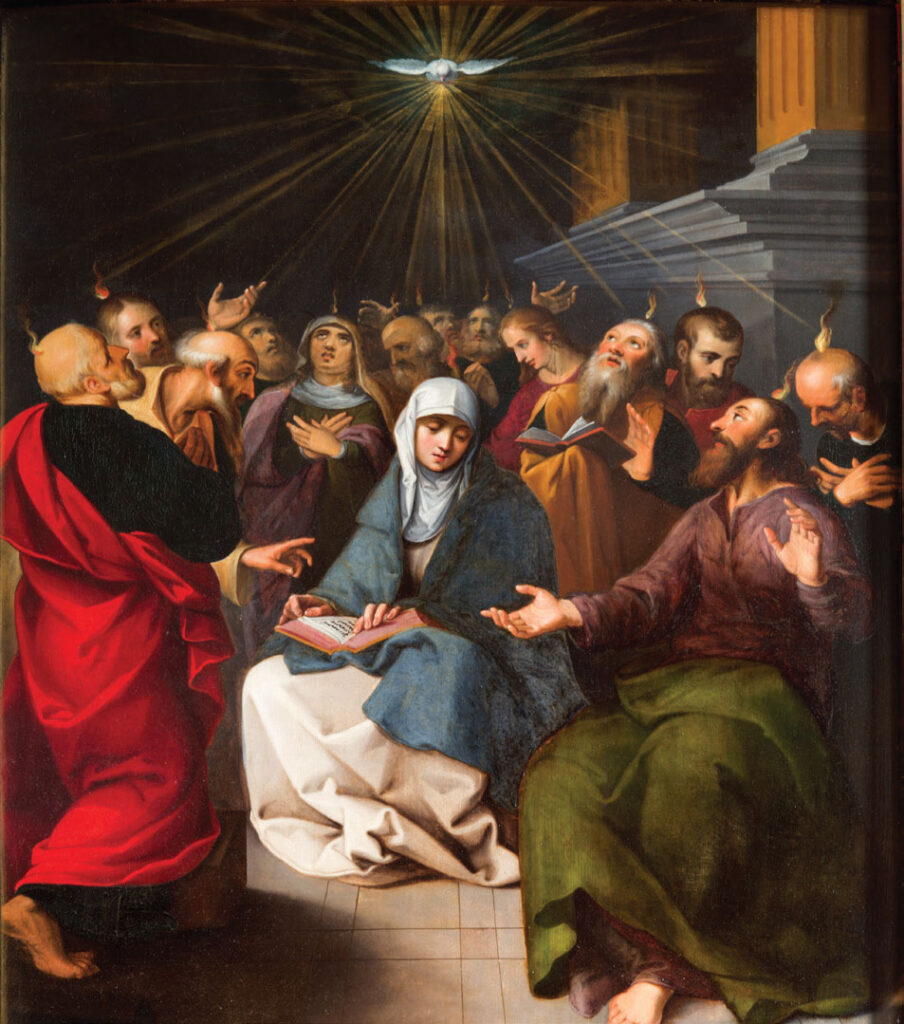
Privileged Vigil of the First Class Violet and Red Vestments
The catechumens whom it had not been possible to baptize at Easter received this sacrament at Pentecost, which explains the similarities between the whole service of this nightly vigil and that of Holy Saturday; it is celebrated at St. John Lateran, it comprises the reading of six Prophecies, the blessing of the water in the baptismal font, the Litanies and the Mass with the ringing of the bells at the Gloria. This Mass, which was the first Mass of Pentecost Sunday, has been also anticipated on the Saturday morning. Private Masses are even allowed.
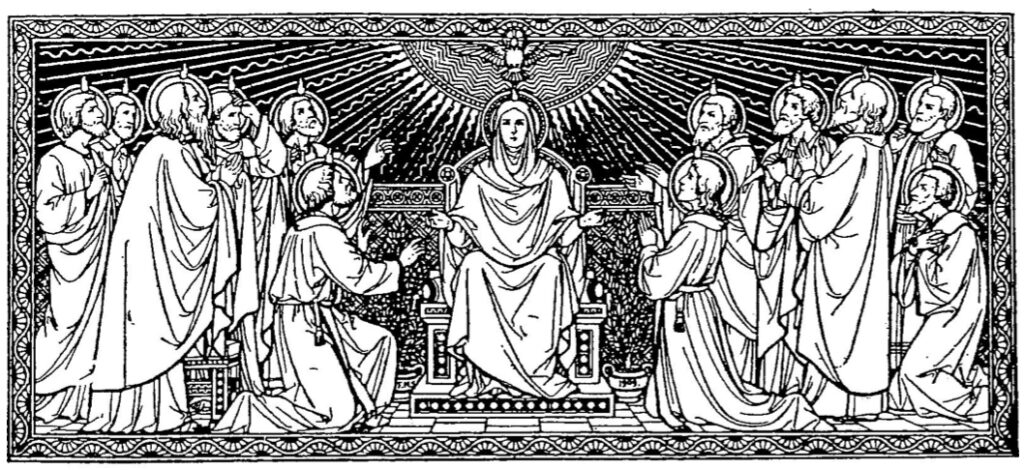
Doctrinal Note for Pentecost
Easter and Pentecost, with the forty-eight days between them, used to be regarded as a single feast of fifty days, on which was kept, first the triumph of Christ, then His entry into His glory, and finally, on the fiftieth day, the anniversary of the Church’s birth.
The Resurrection, the Ascension and Pentecost, are all part of the Paschal mystery. As St. Augustine says, Easter was the beginning of grace, and Pentecost is its crown, since the Holy Ghost then completes the work accomplished by Christ. By His resurrection our Lord has restored to us our rights to the divine life, and at Pentecost He applies them to our souls by communicating to us His Holy Spirit, the “Giver of Life.”
The Ascension forms the boundary line between the two reigns of God in the New Dispensation on earth: the visible reign of the Son of God and the visible reign of the Holy Ghost. The Incarnate Word has finished His external mission among men, and now the Holy Ghost is about to begin His. “The Father” says St. Athanasius, “does everything by the Word, in the Holy Ghost.” Even when the omnipotence of the Father is manifested to us in the creation of the world, we read in Genesis that the Spirit of God moves over the waters to render them fruitful.
Again, when the wisdom of the Word is displayed to us, we are beholden still to the Holy Ghost. It is He “who spake by the prophets”; It was His power that overshadowed the Virgin Mary and made her the Mother of Christ. Finally, it was He, who in the form of a dove descended upon our Lord at His baptism, led Him into the desert, and guided Him through the whole of His public ministry.
But more especially, when He filled the apostles with light and strength on the day of Pentecost, did the Spirit of holiness inaugurate the dominion which he was going to exercise over souls. It was “with the Holy Ghost that the Church was baptized in the Cenacle”, and it was His life-giving breath that came to give life to the mystical Body of Christ, which He had organized after His resurrection. So it was that our Lord breathed on His apostles and said to them: “Receive ye the Holy Ghost . . . Whose sins you shall forgive, they are forgiven them.” And we know that the Holy Ghost is called “the Remission of sins”, and that baptism, whose purpose is to purify our souls from their sins, is given “with water and the Holy Ghost”. “Go out of him, unclean spirit,” says the priest who baptizes, “and give place unto the Holy Ghost the Paraclete”. Thanks to Him, souls are raised to the supernatural state of grace and His supernatural influence can quicken all their thoughts and acts.
Much more than this, where grace is, there is its divine Artificer, which is why the Church calls the Holy Ghost “the sweet Guest of our souls”. He who makes our actions fruitful by “His intimate working”.
It is the purpose of this Holy Spirit to accomplish the work of the formation of the apostles and the Church, in our Lord’s words: “He will teach you all things, and bring all things to your mind, whatsoever I shall have said to you”, and this He does, not only by enlightening the mind, but also by purifying and warming the heart.
The Holy Ghost comes to give testimony to Christ, as the Master Himself foretold, and He gives this testimony not only interiorly by the action of grace in men’s hearts, but exteriorly also, through the medium of the visible hierarchy. The Holy Ghost who once inspired the sacred authors, secures to the Pope and to the bishops grouped around him, that doctrinal infallibility which enables the teaching Church to continue the mission of our Lord. From the Holy Ghost the sacraments instituted by Christ receive their efficacy.
Further, outside the hierarchy, the Holy Ghost raises up faithful souls, who yield themselves with docility to His sanctifying work, this sanctity, which is the triumph of love in the heats of men is justly attributed in the third person of the Holy Trinity, who is the personal love of the Father and the Son. Thus, after the Holy Ghost, the Creed speaks to us of the holy Church, the communion of saints, the resurrection of the body, which is the fruit of holiness and its manifestation in our bodies, and finally of eternal life, which is the plenitude of holiness in our souls.
This supernatural life especially fills our souls at Pentecost, which reminds us of the taking possession of the Church by the Holy Ghost, and which therefore, year by year, strengthens more and more God’s reign within our souls.
Therefore, at Pentecost we celebrate not only the coming of the Holy Ghost, but also the entry of the Church into the heavenly world.
Thus, the anniversary of the Mosaic Law on Sinai becomes, for all Christians, that of the institution of the New Law, by which we receive no more “the spirit of bondage”, but the spirit of adoption of sons, whereby we cry Abba: (Father)”. The Mosaic Law pointed out what had to be done but did not supply help for doing it easily; the Holy Ghost, on the contrary, while making known the Law of the Gospel, gives also abundant graces to practice it, for love is the secret of obedience.
Pentecost is not merely and anniversary, it is also a life, the descent into our hearts of the Holy Ghost. And devotion to the Holy Ghost is the measure of our sanctity.
Historical Note for Pentecost
Before His ascension into heaven, our Lord charges His apostles “that they should not depart from Jerusalem, but should wait for the promise of the Father”, the outpouring of the Holy Ghost. On their return from the Mount of Olives, the disciples, numbering about one hundred twenty, went back to the Cenacle, where they all “were persevering in one mind in prayer with the women, and Mary the Mother of Jesus”.
After this novena, the most solemn ever made, occurred the miraculous descent of the Holy Spirit. which by Divine Providence coincided with the Jewish feast of Pentecost among the Israelites. This “most solemn and most holy day” was the promulgation of the Law on Mount Sinai. Consequently, a considerable number of foreigners who had flocked to Jerusalem from all parts, were witnesses of the coming of the Holy Ghost.
Endued with power from on high, the Church began at Jerusalem, the work of the apostolate entrusted to her by her divine Lord. Peter, the chief of the apostles, first addressed the assembly, and become already a “fisher of men”, brought by the first cast of his net, about three thousand converts into the infant Church. On the following days, the twelve met in the Temple under Solomon’s porch, and like their divine Master, preached the Gospel and healed the sick. Thus, “the multitude of men and women who believed in the Lord, was more increased”.
Subsequently, spreading in all directions outside of Judea, the apostles went forth to proclaim Christ and to give the Holy Ghost to the Samaritans and to the Gentiles everywhere.
Liturgical Note for Pentecost
On the fiftieth day after the passing over of the destroying angel and the crossing of the Red Sea, to the Hebrews encampment at the foot of Sinai, almighty God with great solemnity promulgated His Law. The Jewish feasts of the Passover and Pentecost, which recalled these two events, were the most important in the year.
Sixteen centuries later, the feast of the Passover was marked by the death and resurrection of Christ, and that of Pentecost (fifty days after, as the name implies), by the descent of the Holy Ghost on the apostles. These two feasts, having become Christian in character, are the most ancient of the liturgical cycle, which owes its origin to them. Wherefore, after Easter, Pentecost is the greatest feast of the whole year, having an equally privileged vigil and octave. The book of Acts of the Apostles is read, for this is the season which commemorates the foundation of the Church, of whose beginnings this sacred book gives and account, and this custom is modelled on what takes place in Easter Week. The New Testament puts the Old in its true light by showing that everything that it contained was only the nature of a type. So in the Mass for Pentecost and throughout the octave, the Old and the New Law, Holy Scripture and Tradition, the Prophets of the Church Fathers and the Apostles echo the Master’s words. Like the different pieces of a mosaic, all these parts group themselves in such a way as to bring before the mind a wonderful picture portraying the action of the Holy Ghost down through the centuries of the world’s life.
The priest is clothed in red vestments which recall the tongues of fire. Formerly, in certain churches, while the Veni Sancte Spiritus was being sung, a shower of red roses was let fall from the roof, while a dove flew about over the heads of the faithful. Sometimes a trumpet was sounded during the Sequence as a reminder of the trumpet of Sinai or the mighty sound in the midst of which the Holy Spirit descended upon the apostles.
The octave of Pentecost is privileged of the first order. Thus, is clearly expressed the Church’s intention that during these eight days we should choose for our spiritual reading and meditation subjects connected with Pentecost.
-St. Andrew’s Daily Missal
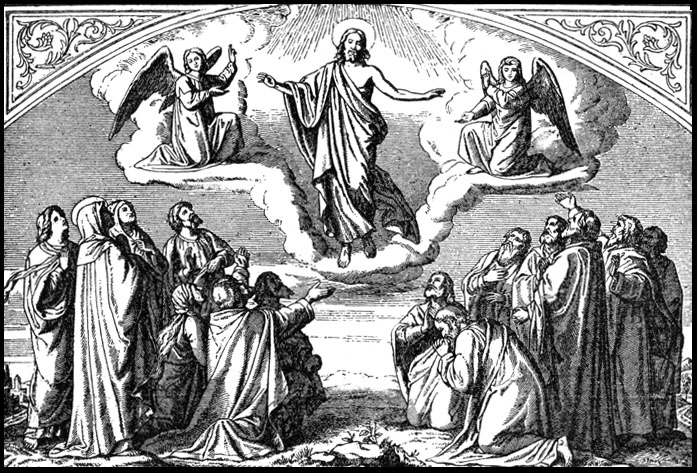
The Epistle and Gospel recall several teachings and warnings of Jesus, which will prove useful to the apostles and to us all after the reception of the Holy Ghost.
"Listen carefully, my son, to the master's instructions, and attend to them with the ear of your heart. This is advice from a father who loves you: welcome it, and faithfully put it into practice"
~ St. Benedict of Nursia ~
Copyright © 2015-2025 Saint Joseph Catholic Church, Latin Mass Parish, 602 S 34th St., Tacoma, WA 98418. All Rights Reserved.
Website comments or questions: info@saintjosephtacoma.org


